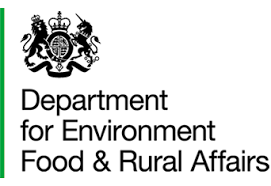Deputy Director, Analysis and Insights
Department for Environment, Food and Rural Affairs
Apply before 11:55 pm on Wednesday 30th October 2024
Details
Reference number
Salary
Job grade
Contract type
Business area
Type of role
Senior leadership
Other
Working pattern
Number of jobs available
Contents
Location
About the job
Job summary
This varied and influential role heads up the Analysis and Insights Division (AID) in the central analytical team, reporting to the Director of Analysis (who is also the Chief Analyst and Chief Economist).
If the successful applicant is an economist, they will also become Defra’s deputy Chief Economist.
This is a pivotal analytical leadership role for the department. You will be an outstanding and authentic analytical leader, capable of setting vision and direction whilst responding effectively to changing priorities, and motivating a high-performing, multidisciplinary team to have real impact on the delivery of Defra’s objectives.
You will lead on cross-cutting strategic analysis to support ministerial priorities and provide exceptional analytical capability to add value to embedded analytical teams.
You will identify and prioritise across departmental objectives, overseeing both short-term responsive work at pace, and longer-term development of the evidence base on priority issues.
You will develop and maintain excellent relationships with other government departments, as well as policy and analytical teams throughout Defra.
Job description
Key responsibilities will include:
- Developing and motivating the multidisciplinary team to have real impact on Defra outcomes, whilst working in an agile way as priorities change, and maintaining and furthering professional capability. The team encompasses the centres of excellence for operational research, economic appraisal, and social research, including evaluation and behavioural insights.
- Identifying, scoping and leading a portfolio of cross-cutting strategic analysis in response to priorities across the breadth of Defra’s objectives, balancing short-term urgent needs with longer-term evidence development. Recent examples have included Defra’s contribution to the economic growth mission, supply chain resilience, the use of Artificial Intelligence in Defra sectors, the impact of inflation, and supporting Defra’s return to the Spending Review process.
- Establishing a reputation as a visible and credible analytical leader, acting as a critical friend and representing the analytical perspective even when this means delivering a message that may not always be welcome, both internally in programme boards and formal committees, and externally as required.
- Providing oversight to the clearance of impact assessments and business cases across the Department, developing the culture of data and analysis-led policy-making, and supporting other analytical teams to develop their expertise to further Defra’s reputation as a robust and evidence-driven department.
- Overseeing the division’s research budget, including identifying research priorities, ensuring research projects deliver value-for-money, and demonstrating strong financial discipline.
- Being an active part of the Central Analysis and Insights Directorate’s senior leadership team, ensuring the wellbeing, development and performance of the whole directorate. You will deputise for the Director and alternate for other Deputy Directors as required.
If the successful applicant is an economist, they will also become the deputy Chief Economist for Defra, supporting the Chief Economist to drive economic excellence across the Department, and working alongside the deputy Head of Profession to support the economics community.
Person specification
Candidates CV and Personal Statement should demonstrate the following essential criteria:
- An empowering leader with a high level of personal resilience and an ability to be flexible and adapt as priorities change. The ability to lead, inspire and create supportive teams who consider the diverse needs of colleagues to create an inclusive and positive culture.
- Exceptional analytical capability across professional boundaries with a track record of setting the strategic direction for an analytical work programme that recognises and takes account of broader considerations.
- Comfortable working at pace to produce proportionate analysis that is fit-for-purpose, timely, influential and impactful, even if significant uncertainty remains.
- An ability to communicate and present complex analysis clearly, succinctly, and with credibility and gravitas to senior decision-makers. An ability to persuade and influence others at all levels, and confidently and constructively challenge when necessary.
- A collaborative approach when working with colleagues from policy and different analytical disciplines to deliver complex programmes across organisational boundaries, and experience of building highly effective working relationships with a range of stakeholders, even where there may be different priorities or perspectives, to produce analytically rigorous and effective outcomes.
Memberships
Information about each of the professions can be found as follows:
Economists are members of the Government Economics Service (GES). https://www.gov.uk/government/organisations/civil-service-government-economic-service.
Operational Researchers are members of the Government Operational Research Service (GORS). Information about the GORS. http://www.operational-research.gov.uk/recruitment.
Social Researchers are members of Government Social Research (GSR). https://analysisfunction.civilservice.gov.uk/government-social-research/.
Statisticians are members of the Government Statistician Group (GSG) Government Statistical Service and Statistician Group – Government Analysis Function (civilservice.gov.uk).
Geographers are members of the Government Geography Profession. Applicants must have a degree in geography or related subject or equivalent knowledge gained through professional experience. Candidates will be probed at interview on their use of geography in professional analytical roles and commitment to continued professional development.
If you are applying from outside of the Civil Service, you must be prepared to gain membership of the relevant analytical profession above, or belong to another relevant analytical profession (e.g. Data Scientist). Please state your profession in your application.
Behaviours
We'll assess you against these behaviours during the selection process:
- Leadership
- Communicating and Influencing
- Seeing the Big Picture
- Working Together
Benefits
- Learning and development tailored to your role
- An environment with flexible working options
- A culture encouraging inclusion and diversity
- A Civil Service pension with an average employer contribution of 27%
Things you need to know
Selection process details
As part of the application process, candidates are asked to complete a CV and Personal Statement (no more than 1250 words) on how your relevant skills and experience meet the essential criteria. Completed applications must be submitted no later than the closing date of 30th October 2024 at 23:55pm
Sift
A sift will be conducted against the key criteria above and will assess your experience. The sift is to be conducted w/c 4th November.
Assessments – Staff Engagement Exercise (SEE)
This assessment will not result in a pass or fail decision. Rather, it is designed to support the panel’s decision-making and highlight areas for the panel to explore further at interview.
Full details of the assessment process will be provided to shortlisted candidates at the earliest opportunity.
For further information regarding the assessments please visit - https://scs-assessments.co.uk/
Short listed applicants may be offered an informal discussion with the Vacancy Holder.
Interviews
You will be asked to attend a virtual panel interview to have a more in-depth discussion of your previous experience and professional competence in relation to the essential criteria for the role
Other Information
Please let us know what adjustments we can put in place to help you through the recruitment process if you are disabled.
Candidates who pass the interview criteria but are not offered a post may be kept on a reserve list for 12 months and may be offered similar roles across the department.
Defra Is committed to ‘name blind’ sifting. That means that identifying characteristics such as your name, gender, age, or address are removed from your application until after shortlisting for interview has taken place.
Feedback will only be provided if you attend an interview or assessment.
As part of accepting this role you will be agreeing to the expected assignment duration set out above. This will not result in a contractual change to your terms and conditions. Please note this is an expectation only, it is not something which is written into your terms and conditions or indeed which the employing organisation or you are bound by. It will depend on your personal circumstances at a particular time and business needs, for example, would not preclude any absence like family friendly leave. It is nonetheless an important expectation, which is why we ask you to confirm you agree to the assignment duration set out above.
Security
Nationality requirements
Working for the Civil Service
We recruit by merit on the basis of fair and open competition, as outlined in the Civil Service Commission's recruitment principles (opens in a new window).
Diversity and Inclusion
Apply and further information
Contact point for applicants
Job contact :
- Name : SCS Candidate
- Email : scscandidate.grs@cabinetoffice.gov.uk
Recruitment team
- Email : scsrecruitment.grs@cabinetoffice.gov.uk




